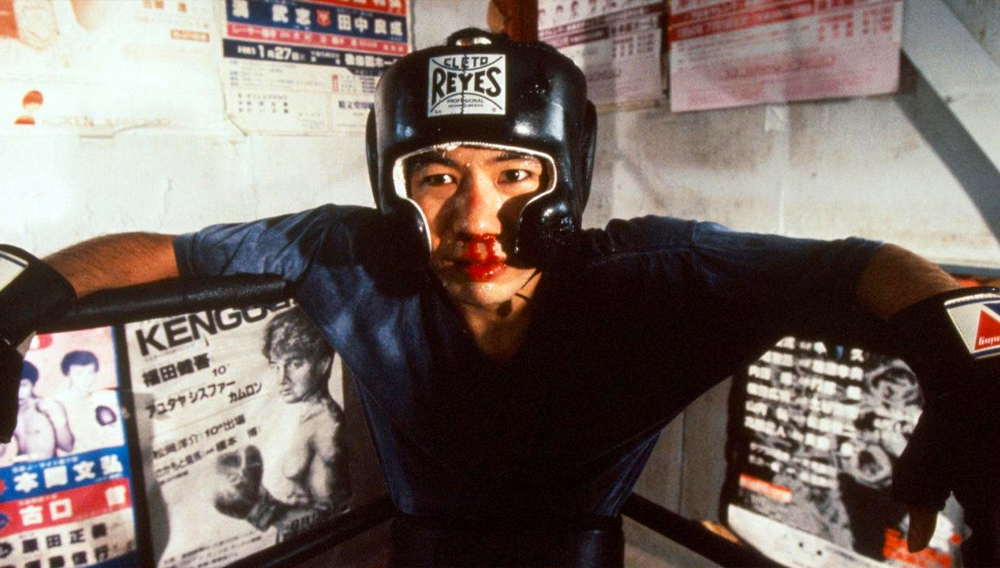New Directors/New Films, presented by the Film Society of Lincoln Center and the Museum of Modern Art, opens today with Marielle Heller‘s The Diary of a Teenage Girl (reviews) and closes on March 29 with Rick Alverson‘s Entertainment (reviews). All in all, 26 features and 16 shorts will screen in this 44th edition, and, alongside Jordan Cronk‘s preview here in Keyframe, we’ll be tracking some of the most notable writing to emerge from this year’s round right here.
Introducing Slant‘s extensive coverage, Ed Gonzalez argues that “what’s most breathtaking about this year’s selection is how vigilantly so many of the films detour down stylistic back roads that often yield new perspectives on the blurring of art and life. Like Britni West‘s Tired Moonlight, an ‘unornamented measure of a small town’s way of life’ (according to our own Sean Nam) starring Alex Karpovsky, Virgil Vernier’s Mercuriales, a ‘mosaic of different sensorial impressions’ (per James Lattimer) set in and around the Les Mercuriales twin towers in Paris, and Benjamin Crotty‘s Fort Buchanan, a carnal melodrama starring the impossibly sexy Andy Gillet as a man taking care of his daughter alongside other army wives as his estranged husband carries out a mission in Djibouti. The story is a queer utopia that, in its canny modulations of tone, from the comedic to the poignantly ethereal, is also queerly realized. It’s a highlight of a festival that’s optimally geared to steal a gratifying sense of discovery from its audience.”
Fort Buchanan is “a delicious mix of comedy and melodrama,” agrees Gary M. Kramer at /bent. And back in Slant, Jesse Cataldo: “Awash in textural richness, the film is less about the reality of this situation than its ambiance, an atmosphere of desire—whether quashed, fulfilled, or neglected—bubbling up in strange and unexpected ways, all conveyed in fuzzily tactile 16mm.” Update, 3/21: “To the right crowd, there are a lot of familiar faces,” notes Forrest Cardamenis at the Film Stage: “Andy Gillet played lead in Eric Rohmer’s Romance of Astree and Celadon; Mati Diop of 35 Shots of Rum and a talented director in her own right features prominently; Iliana Zabeth, Pauline Jacquard, and Judith Lou Lévy all have parts in House of Pleasures. All this (relative) star power goes a long way.”
Updates, 3/29: “Former painter Crotty shot mostly in his adopted France for 15 days at a time during four distinct seasons, two years running,” notes Howard Feinstein, writing for Filmmaker. “The surrounding trees and streams are beautiful, but the film’s architecture, correlated to mindsets, provides the strongest—and strangest—imagery.” Interviews with Crotty: Paul Dallas (Film Comment) and Sarah Salovaara (Filmmaker).
“Charles Poekel’s first feature, Christmas, Again, is the kind of unflinching yet tender New York sidewalk story that risks becoming a cliché of downbeat naturalism,” writes the New Yorker‘s Richard Brody. “Yet Poekel skirts this risk, and creates a minor marvel of quasi-documentary discovery.” Noel, who sells Christmas trees, “is played by Kentucker Audley, a director as well as an actor (Amy Seimetz’s Sun Don’t Shine). Lydia, a young woman whom Noel shelters in his trailer, is played by Hannah Gross, who, at 22, has already acted in films by Matt Porterfield, Nathan Silver and Dustin Guy Defa. Poekel’s crew is headed by the cinematographer Sean Price Williams and the editor Robert Greene (the director of Actress), who have worked on some of the best recent independent films, including Listen Up Philip. Poekel’s cast and crew are, in effect, a movie-in-a-box—just add a director and an idea—and they realize Poekel’s sense of lived-in, firsthand experience.”
Mike D’Angelo in a dispatch to the Dissolve from Sundance: “Poekel’s atmospheric direction nicely conveys the melancholy mood, but Christmas, Again wouldn’t work without Audley, who’s given very little dialogue—Noel rarely speaks except to do business—but manages to silently suggest a churning sea of stifled emotion. He makes this stoic, often kinda dickish loner into mesmerizing company.” And Clayton Dillard for Slant: “There’s little daring within Christmas, Again at most every level, but Poekel nonetheless displays an assured directorial hand and maintains a modest, appealing, even droll sensibility throughout.”
Update, 3/29: For Christopher Bourne at Twitch, this is “a small, but subtly resonant and quite lovely film.”
In the New York Times, A.O. Scott previews seven favorites screening during the first week, among them, The Creation of Meaning: “Filmed in a rugged, stunningly picturesque part of Northern Italy, Simone Rapisarda Casanova’s slow-moving, meditative hybrid of documentary and fiction consists mainly of an extended visit with Pacifico Pieruccioni, who farms and tends sheep in the mountains…. [T]he pastoral mood is disturbed by vivid memories of war—German soldiers and Italian partisans battled on these hillsides, and a film crew is busy recreating their battles—and by Europe’s present-day political and economic troubles…. [W]hat Mr. Casanova conveys, powerfully and delicately, is the way daily routines and historical forces converge around an individual to give shape and significance to his life.”
At Slant, Carson Lund puts it another way: “One of the film’s most salient through lines is its ongoing dialogue—in conversations, radio broadcasts, and tourist activity—of Italy’s political past and present.” Update, 3/21: “Searching, earthy, and droll, Casanova has made a tour of time, space, and place, an occasionally overgrown net of history, genre, and feeling whose roundabout aim it is to catch nothing short of sense and significance,” writes Jeremy Polacek for the L. Update, 3/29: For Christopher Bourne at Twitch, this is “an experience as mystically ethereal as it is vividly earthy.”
Writing in the Voice, Calum Marsh finds himself “fascinated by Violet, a short, beguiling drama that traces the reverberations of a teen’s death by stabbing in a shopping mall in Brussels. The debut feature of Flemish director Bas Devos, Violet is deft and rigorous, oblique to the point of inscrutability. (Shot in part on 65mm, it’s also exceptionally beautiful.) But what’s apparent throughout is that Devos sees the world in a way quite his own. He shoots BMX bikers like ballet dancers, and a heavy-metal concert like a kinesthetic trance. I don’t know if Violet is a great film. But I am sure that there’s nothing like it.”
“Violet can’t help but call to mind Gus Van Sant’s Paranoid Park,” finds Christopher Gray at Slant. “Devos’s film, though, is often distant and impassive where Van Sant’s was searching and tender.”
Howard Feinstein for Filmmaker: “The digressions in this otherwise fairly straightforward story—the aftershocks for a teen BMX freestyle cyclist who witnesses a close friend’s senseless murder—feel like fruitful collaborations between masters of painting, animation, and photography.”
Updates, 3/22: First, let’s make note of the fresh updates to entries on films screening at ND/NF 2015: Rick Alverson‘s Entertainment, Veronika Franz and Severin Fiala’s Goodnight Mommy, Nadav Lapid’s The Kindergarten Teacher, Kornél Mundruczó’s White God, Bill and Turner Ross‘s Western and Myroslav Slaboshpytskiy’s The Tribe.
Second, let’s return to a couple of films previously mentioned by Slant‘s Ed Gonzalez, starting with Tired Moonlight. The L‘s Mark Asch writes that Britni West, “currently of Bed-Stuy, returns to Kalispell, Montana, on the edge of Glacier National Park (also the hometown of Brad Bird and Michelle Williams!), for a feature debut in the recent tradition of Matt Porterfield and Tim Sullivan’s new regional American indie cinema: a locally recruited nonpro cast enacts everyday scenarios with a lazy-river plotlessness, for a camera swayed equally by the currents of accidental natural and man-made beauty, and observationally based anthropology and class consciousness.”
“Since taking home the Grand Jury Prize at Slamdance, most reviews have charged Britni West’s naturalistic narrative Tired Moonlight with the ‘documentary-like’ or ‘hybrid’ stamp of approval, but more than anything else, the film seems to suggest that such classifications were meant to be broken,” writes Sarah Salovaara, introducing her interview with West for Filmmaker. And Steve Dollar chats with West, too, for the Wall Street Journal.
“Tired Moonlight has some of the romantic melancholy promised in its title,” writes the NYT‘s A.O. Scott, “but it’s also full of the oddness and vitality that are essential to the continued promise of American cinema (and American life).”
Update, 3/29: “The idea of a sleepy, stuck-in-time town steeped in Americana grows further with every Apple product and technological promise,” writes John Lichman at Hammer to Nail. “It’s the dream-like nature Britni West captures in her debut feature, Tired Moonlight, that strives for a balance between a home and a NASCAR-soaked nightmare.”
Jeffrey Dunn Rovinelli at the L on Mercuriales: “Tracing the loosely sketched trajectories of two young women in a Parisian suburb and Russian expat community under the constant presence of the logo of the titular apartment complex, which floats overhead like some corporate-governmental God, Vernier’s film is aesthetically stunning, embedding lines of capital and strictures of social classes within its serpentine camera movements and lush color schemes, as it lilts between situations both mundane—the sharing of dreams and ambitious between friends, a birthday party gone strange—and deliberately exploitative.”
“Vernier, known for his documentary work, here attempts at his first full length narrative feature,” notes Dustin Chang at Twitch. “The film can be seen as a fairytale—sort of Little Red Riding Hood in a concrete jungle.”
“India’s caste system is notorious for keeping members of differing social classes apart, but one of the few places where they do meet is in court,” writes Jessica Loudis in the L. “Chaitanya Tamhane’s excellent debut is a dispassionate look at the country’s antiquated judicial system and the ways in which it fails to reflect contemporary life.”
“Instead of turning the material into an angry brimstone-and-fire polemic, Tamhane surveys these flawed characters and troubled institutions with a coolly dissecting eye,” writes Kenji Fujishima in Slant. “Court, in fact, often exudes the aura of a legal brief: Each scene makes the points it wants to make, clearly and economically, before moving on to the next. But Tamhane’s acute feel for naturalism and remarkably subtle and non-declarative grasp of characterization negate any sense of a mere pile-up of talking points…. Tamhane purposefully extends scenes a bit longer than one would expect in order to include a seemingly unrelated detail that nevertheless adds an extra layer to the film’s overall societal critique.”
Update, 3/24: Court has won best feature at India’s 62nd National Film Awards. Nyay Bhushan has details in the Hollywood Reporter. Update, 3/29: “Biting and devastating, Court is one of the real standouts of this year’s New Directors/New Films,” declares Dustin Chang at Twitch.
“Yuriy Bykov continues to emerge as one of Russia’s foremost young filmmakers with The Fool, a morally upright class drama set within a culture that rewards corruption and greed and punishes the honorable and decent,” writes Drew Hunt at Slant. “As evinced in his previous work, Bykov treats his narratives like well-oiled machines, the action constantly churning even when things seem uneventful.”
It “tells the story of one man’s desperate attempt to save 800 tenants living in a dangerously dilapidated building,” notes Nikola Grozdanovic at the Playlist. “It’s another thunderous win for Russian cinema, mercilessly tearing at the stitches of a country’s political system to reveal a festering wound.”
And it “is in some ways a blunter, more floridly melodramatic version of Leviathan,” suggests the NYT‘s A.O. Scott. More from Christopher Bourne (Twitch), Forrest Cardamenis (Film Stage, B-) and Howard Feinstein (Filmmaker).
“There are people who would take the idea of an adaptation of Franz Kafka’s Castle set in Mongolia as a too-perfect parody of a certain kind of art-house cinema,” grants the NYT‘s A.O. Scott. “There are others who would find it irresistible. I tend toward the second camp, but this film, directed by Emyr ap Richard (who is Welsh) and Darhad Erdenibulag (who is Mongolian), defies expectations in the best ways. Produced by Jia Zhangke, the Chinese director responsible for some of the most challenging and vital films in modern cinema, K is funny, sexy and odd—Kafkaesque in previously undiscovered senses of the word.”
“It’s a compelling conceit in theory, but in practice it cores the material of its meaning,” finds Chuck Bowen in Slant. “The aesthetic is at odds with the obsessive, lonely claustrophobia of the source material, draining the plot, which is pointedly meaningless on its own, of its sense of existential foreboding…. Picture Inherent Vice without the majestically elusive emotional undertow of the Golden Fang and you’ve got an idea of the problem here.”
“This is an acausal world of contained chaos,” writes Howard Feinstein for Filmmaker. “Things just happen…. K proves to be an unreliable narrator. We are not only distanced, we are left out of the loop altogether.”
“The film, like the book, leaves its lost man’s fate unresolved,” notes Aaron Cutler in the L. Forrest Cardamenis at the Film Stage: “Most surprising, Emyr and Erdenubilag’s film is genuinely romantic; above all, K is about trapped lovers, driven to exploit and distrust one another because of the invisible, only gradually apparent corrupt system.”
Update, 3/24: For Nikola Grozdanovic at the Playlist, “K is a resounding failure and a butterfingered attempt to capture the essence of a literary genius.”
“The titular character of Tu Dors Nicole is a girl cut in two, as evidenced by director Stéphane Lafleur‘s compositions, with Nicole (Julianne Côté) often severed by the margins of the frame,” writes Clayton Dillard at Slant. “She’s a wayward twentysomething, caught between her tenuous desires for independence and a more forceful reluctance to forgo the sweet pangs of juvenilia. Lafleur has a percipient eye for irrigating these dilemmas without overtly sentimentalizing them, especially as the film flirts with diagnosing Nicole’s desolation as mental illness, manifest through insomnia and habitual forms of self-sabotage.”
“Mr. Lafleur faces a challenge familiar to many young North American filmmakers,” writes the NYT‘s A.O. Scott: “How to convey the tedium of contemporary life without succumbing to it or loading it up with dubious significance. His response, which leans heavily on the work of an older generation of hipster filmmakers (Jim Jarmusch most obviously), is to wield the camera with cool, knowing rigor and to allow his star to explore the range of her charm until she finds its limit.”
“Lafleur’s talent is in his delicate writing aided by the droll visual composition,” writes Dustin Chang at Twitch. “Small things in Nicole’s life have a tendency to resurface in physical forms in surrealistic way. I find his deadpan humor and subtle, surrealist touches irresistibly charming.”
“Sometime towards the end of his life, Marlon Brando envisioned ‘a highly personalized documentary on the activities of myself,’ and we know that because we hear him describing it, on tape,” writes Flavorwire‘s Jason Bailey. “Steven Riley’s innovative documentary portrait is filled with those recordings—autobiographical notes, interviews, even ‘self-hypnosis’ for relaxation and weight loss—so many that Brando is able to narrate his own life story, from the grave…. [L]ike its subject, [Listen to Me Marlon] is a little odd, a little unconventional, and endlessly fascinating.”
“Often referred to as an ‘enigma,’ it’s perhaps fitting that Brando’s legacy is being vigorously reexamined in the wake of the tenth anniversary of his death last July,” writes Richard Porton, who’s spoken with Riley and Brando’s daughter, Rebecca, for Bio. “Riley’s film, in tandem with Susan L. Mizruchi’s admiring study, Brando’s Smile (which argues that the actor, known for visceral emotion, was in fact a self-taught intellectual) and Florence Colombani’s new monograph
















